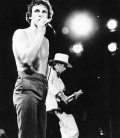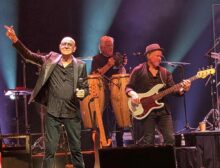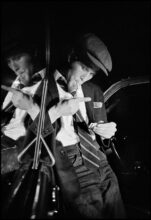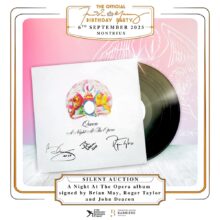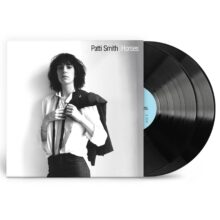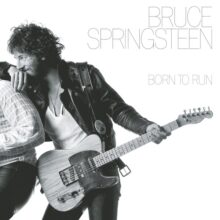An official video for ‘Don’t Look Back’, the classic 1978 reggae hit by Peter Tosh and Mick Jagger, is now streaming on YouTube.
When Peter Tosh teamed up with Mick Jagger for the 1978 single Don’t Look Back, reggae crossed paths with rock in a way that would define an era. The track not only became Tosh’s best-known international hit but also marked the rare moment when a Rolling Stone stepped into Jamaica’s rebel sound to help push it to a wider audience.
The song itself wasn’t new. Originally written and recorded by Smokey Robinson for The Temptations in 1965 under the title (You Gotta Walk) Don’t Look Back, it had been a modest R&B chart success but never reached mainstream recognition. Tosh, the militant reggae pioneer and one-time founding member of The Wailers, heard something deeper in the lyric—a call to resilience, to move forward despite oppression. For Tosh, Don’t Look Back was a protest anthem cloaked in Motown soul.
By the mid-1970s, Tosh had left The Wailers after clashing with Bob Marley and Bunny Wailer over both musical direction and business decisions. He signed to Columbia Records and released Legalize It in 1976, an album that set out his manifesto of cannabis decriminalisation and Rastafarian rights. While Marley was being elevated as reggae’s global icon, Tosh refused to compromise. His second solo record, Equal Rights (1977), was even more confrontational, filled with revolutionary themes.
It was this uncompromising stance that caught the attention of Rolling Stones Records, the label the Stones had launched in 1970 to release their own music and projects by other artists. Keith Richards, a reggae aficionado who spent long stretches in Jamaica, brought Tosh into the Stones orbit. Mick Jagger, fascinated by reggae’s raw political energy, stepped in to lend his star power to Tosh’s next project.
The result was Bush Doctor, Tosh’s 1978 album and his first for Rolling Stones Records. The record featured guest appearances from both Jagger and Richards, but it was the duet between Jagger and Tosh on Don’t Look Back that made the biggest impact. Jagger’s decision to appear wasn’t simply a vanity cameo. He understood that Tosh’s music, powerful as it was, needed a bridge to mainstream radio—particularly in the U.S., where reggae was still seen as a niche sound. Jagger gave the single that extra commercial push.
Released as a single in 1978, Don’t Look Back climbed to No. 81 on the U.S. Billboard Hot 100 and became a Top 20 hit in the UK. The accompanying music video, which showed Tosh and Jagger side by side, was among the first reggae clips to receive heavy rotation on television, further boosting its visibility. For Tosh, the collaboration gave him something Marley already had—an entry into the global pop market.
Yet Tosh never softened his edge. Bush Doctor still carried political fire, with songs like Stand Firm and Dem Ha Fe Get a Beatin’. His follow-up albums on Rolling Stones Records, Mystic Man (1979) and Wanted Dread and Alive (1981), continued in the same militant vein. Unlike Marley’s vision of “one love,” Tosh’s reggae was about confrontation and resistance. That duality helped broaden reggae’s image, showing it could be both spiritual and revolutionary.
Peter Tosh’s life, however, was as volatile as his music. Born Winston Hubert McIntosh in Westmoreland, Jamaica, in 1944, he grew up in Kingston’s Trenchtown and became a self-taught guitarist before forming The Wailers with Bob Marley and Bunny Wailer in the early 1960s. With The Wailers, Tosh helped shape the ska and rocksteady sounds that would evolve into reggae. But by 1974, tensions with Marley pushed him to pursue a solo career.
His solo path was never easy. Tosh survived brutal beatings by Jamaican police, lived under constant political pressure, and remained outspoken against both local corruption and global inequality. Even after Don’t Look Back gave him international visibility, he refused to water down his message.
Tragically, Tosh’s story ended violently. On September 11, 1987, just as he was staging a career resurgence, gunmen invaded his home in Kingston. Tosh and two others were murdered in what was officially described as a robbery, though many believe the killing was politically motivated. He was only 42.
Stay updated with your free Noise11.com daily music news email alert. Subscribe to Noise11 Music News here
Be the first to see NOISE11.com’s newest interviews and special features on YOUTUBE and updated regularly. See things first SUBSCRIBE here: Noise11 on YouTube SUBSCRIBE
Noise11.com
Follow us at https://bsky.app/profile/noise11.bsky.social
Noise11 on Instagram
Comment on the news of the day, join Noise11 on Facebook


